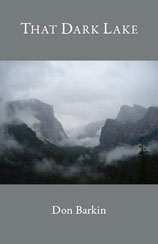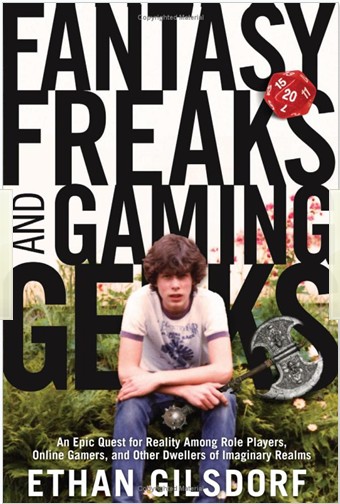One of the abiding pleasures of writing books, and being lucky enough to have them published, is the way in which they have led me to discover parts of the literary world I may not have discovered otherwise. Among them is a brand of science fiction and fantasy that's been given all kinds of labels—my favorite is the New Weird—but basically boils down to books in which many strange and interesting things happen, and in which the writing is really, really good. My running favorite author in this group, which makes him one of my favorite living authors, period, is Jeff VanderMeer, a prolific and vastly talented writer perhaps best known for his books about a fantastical, decaying, and distinctly postcolonial city called Ambergris. In these books, VanderMeer displays not only an astonishingly rich imagination, but also a pretty ridiculous command of numerous fiction styles, from quasi-Borgesian to hard-boiled noir. His books are social, political, personal: everything I want in fiction. If I were the competitive type, I'd say he's the man to beat. Which is why when Matthew Cheney—an NHR contributor, among many, many other things—asked me if I'd contribute to a series of reviews on VanderMeer's new short-story collection, The Third Bear, I was all over it.
I said before that one of the things I like so much about VanderMeer's writing is his deft mixture of the social, political, and personal. "The Goat Variations," which Kevin Brockmeier singled out for praise in his blurb of The Third Bear, accomplishes this to great effect, as the leaders of a nation falling apart at the seams catch wind that a calamity is coming, but don't know how to stop it. Oh, right—this story also involves alternate realities and time travel, which makes for a really heady mixture. Conceptually, VanderMeer sets up a very difficult task, that of writing directly about George W. Bush without hitting us over the head, and yet still giving the story teeth. He might not quite get away with it; there's still a sense that VanderMeer's too close, that there hasn't been quite enough time to digest it all. I say this with humility, though: I would have been a bit frightened to even attempt to write a short story like this, and certainly wouldn't have done as well. And the story still has plenty of teeth, as I find myself returning in my mind to VanderMeer's vivid image of George W. at the beginning of his administration, bludgeoned by catastrophe, the world as he knows it ending all around him, and him just not knowing what to do.
And then there's "Three Days in a Border Town," which is one of the best pieces of short fiction I've read in years; it's no wonder it showed up on awards and best-of lists when it was published in 2004. In it, a sharpshooter moves through a dusty border town in the middle of a desert, looking for her husband, but it's about so much more than that. It's about devastating loss, hovering just beyond the horizon; it's about figuring out how to move on. Matthew Cheney has said why this story is amazing as well as anyone, and he's right. It's Beckett, it's the better end of Dennis Lehane (particularly the short story "Until Gwen," with which it shares a narration written, with wild success, in the second person), and it's VanderMeer at his best, precise and luminous, transporting and transfiguring. "Three Days in a Border Town" is the kind of story that seems to take in the whole world, to be about everything at once, and it shows that when VanderMeer's writing at the top of his game—which is pretty much all the time—it's foolish to talk about beating him, because you can't.
 Director Devin Brain and the cast of the current Yale Summer Cabaret show, The Phoenix, have given themselves quite a task: to render a situation that could be either fantasy or reality, when either is potentially alienating. Based on a haunting story by best-selling Australian author Isobelle Carmody, the play has been derived by the cast via an improvisational process of discovery, which means that the presentation is not scripted so much as agreed upon through trial and error during a long period of gestation.
Director Devin Brain and the cast of the current Yale Summer Cabaret show, The Phoenix, have given themselves quite a task: to render a situation that could be either fantasy or reality, when either is potentially alienating. Based on a haunting story by best-selling Australian author Isobelle Carmody, the play has been derived by the cast via an improvisational process of discovery, which means that the presentation is not scripted so much as agreed upon through trial and error during a long period of gestation.
 The Long Wharf Theatre production of Henrik Ibsen's A Doll's House managed a surprising feat: it made the play more entertaining without significantly altering it. If you're a purist who wants to see Ibsen played straight, it does that; but if you think that a play like ADH, with its winsome wifey who gets into some hot water due to an "innocent" forgery, then gets out of it only to slam the door on her happy-ever-after home, is a bit dated and could use some kind of make-over, well, this show does that too.
The Long Wharf Theatre production of Henrik Ibsen's A Doll's House managed a surprising feat: it made the play more entertaining without significantly altering it. If you're a purist who wants to see Ibsen played straight, it does that; but if you think that a play like ADH, with its winsome wifey who gets into some hot water due to an "innocent" forgery, then gets out of it only to slam the door on her happy-ever-after home, is a bit dated and could use some kind of make-over, well, this show does that too.
 “Art” by Yasmina Reza first appeared in Paris in 1995. Shortly afterwards it was translated into English for the British stage and turned up at the Royale Theatre (now the Bernard B. Jacobs Theatre) on Broadway on March 1, 1998. The cast was stellar for this three-person play, performed without intermission. The six-month Broadway run included Alan Alda, Victor Garber, and Alfred Molina, all well known film and theatre performers.
“Art” by Yasmina Reza first appeared in Paris in 1995. Shortly afterwards it was translated into English for the British stage and turned up at the Royale Theatre (now the Bernard B. Jacobs Theatre) on Broadway on March 1, 1998. The cast was stellar for this three-person play, performed without intermission. The six-month Broadway run included Alan Alda, Victor Garber, and Alfred Molina, all well known film and theatre performers. Bernard-Marie Koltès' Battle of Black and Dogs (Combat de nègre et de chiens), translated by Michaël Attias, and directed by Robert Woodruff, is the second play this season at the Yale Rep to take us to vague environs in Africa to witness a drama among a small group of people cut off from the world at large. Like Danai Gurira's Eclipsed, BBD places us in a compound, but this time it's a "construction site run by a foreign company in a West African country, anywhere from Senegal to Nigeria," where the main characters, white and French, are confronted by Alboury (Albert Jones), a member of a local Wolof tribe who wants to retrieve the body of a worker at the site who has recently died or been killed.
Bernard-Marie Koltès' Battle of Black and Dogs (Combat de nègre et de chiens), translated by Michaël Attias, and directed by Robert Woodruff, is the second play this season at the Yale Rep to take us to vague environs in Africa to witness a drama among a small group of people cut off from the world at large. Like Danai Gurira's Eclipsed, BBD places us in a compound, but this time it's a "construction site run by a foreign company in a West African country, anywhere from Senegal to Nigeria," where the main characters, white and French, are confronted by Alboury (Albert Jones), a member of a local Wolof tribe who wants to retrieve the body of a worker at the site who has recently died or been killed. Review of
Review of 

 Meyer Levin, a writer best-known for his novel Compulsion, the story of the Leopold-Loeb murder and trial, wanted to be known as the man who wrote a play based on the diary of Anne Frank. He met with Otto Frank to discuss that possibility before Anne’s book had even been published in the U.S.
Meyer Levin, a writer best-known for his novel Compulsion, the story of the Leopold-Loeb murder and trial, wanted to be known as the man who wrote a play based on the diary of Anne Frank. He met with Otto Frank to discuss that possibility before Anne’s book had even been published in the U.S.